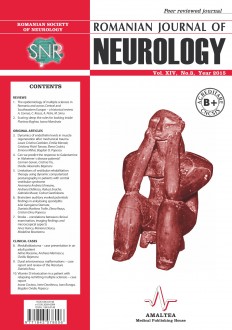SELECT ISSUE

Indexed

| |

|
|
|
| |
|
|
|

|
|
|
|
|
|
| |
|
|
HIGHLIGHTS
National Awards “Science and Research”
NEW! RJN has announced the annually National Award for "Science and Research" for the best scientific articles published throughout the year in the official journal.
Read the Recommendations for the Conduct, Reporting, Editing, and Publication of Scholarly work in Medical Journals.
The published medical research literature is a global public good. Medical journal editors have a social responsibility to promote global health by publishing, whenever possible, research that furthers health worldwide.
CAN WE PREDICT THE RESPONSE TO GALANTAMINE IN ALZHEIMER`S DISEASE PATIENTS?
Carmen Gavan, Cristina Tiu and Ovidiu Alexandru Bajenaru
ABSTRACT
Although considerate progress was obtained by adding imagistic and laboratory test, clinical examination remains the core of the diagnosis for Alzheimer`s disease. After 20 years of experience with anticholinergic drugs we know that only one third of the patients respond to the treatment; the treatment is more efficient in the initial stages of the neurocognitive decline. It is important to evaluate the efficacy of drugs as soon as possible. We examined patients with mild and moderate Alzheimer`s disease referred through our outpatient clinic. They fulfilled the NINCDS-ADRDA criteria for Alzheimer`s disease and they scored at baseline 21 to 26 points on MMSE. The patients were treated with Galantamine, 8 mg/day for the first month and then 16 mg/day. We evaluated the patients after 2 and 6 months of treatment; we performed MMSE and ADAS-Cog in order to see if a more complex evaluation would be helpful. We considered that the treatment was efficient if MMSE score did not decrease after 6 months of treatment. We also evaluated clinical disability using DAD (Disability Assessment for Dementia Scale) and the difficulty of living with a patient with dementia using CBS (Caregiver Burden Scale). The examination using MMSE and ADAS-Cog after two months of treatment does not have a predictable value. ADAS-Cog examination can be useful for patients that have a stable MMSE score after six months of treatment. Although the evolution of ADAS-Cog and MMSE scores were significantly positive, clinical disability of the patients progressed, rising concerns for their caregivers.
Keywords: Alzheimer`s disease, MMSE, ADAS-Cog, DAD, CBS, galantamine
Full text | PDF
